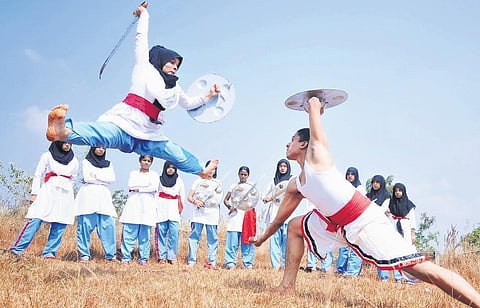

KOCHI: Kalaripayattu, the traditional martial art form that originated in Kerala, has always been a man’s game. But veteran Kalari trainer, Hamzathali Gurukkal brought a change to this custom when he decided to introduce his five-year-old granddaughter Arifa Kodiyil to the artform. The Malapuram-native didn’t have a good start. A Muslim girl learning Kalari did raise many eyebrows.
Having turned 26 recently, hijab-clad Arifa slays her competitors, flashing her urumi with all might, following the footsteps of legendary warrior Arackkal Ayesha. “Growing up, I used to watch the men in my family practice and teach Kalari. I used to think everyone needed to learn Kalaripayattu. At the age of five, seeing my interest in the art form, my uppuppa decided to train me,” says Arifa.
Road less taken
This five-time national champion was the first girl from Malapuram to master the art form. “Since I didn’t have any women to practice with, my brother Ashif used to spar with me. At most competitions too, I was the only girl, or rather, the only Muslim who represented Malapuram back in the day,” says Arifa.
After the demise of Gurukkal Hamzathali, his son K M Haneefa Gurukkal runs the Hamzathali Gurukkal Smaraka Kalari. “When Arifa was introduced to Kalari lessons, many people from the community asked us to not let her perform on stage, that Kalari is not ideal for a woman to practice. We, as a family never paid heed to those words. We always asked our kids not to get bogged down by the comments,” says Haneefa.
The ones who pointed fingers soon clapped for the family when they realised the importance of self-defence techniques. “We are living in a time when both genders need to know how to protect themselves. More parents have started sending kids in the age of four to our centre,” adds Haneefa.
A woman’s game
Arifa believes it is essential for women to learn martial arts. “In the women-only batch, around 50 girls are being trained at the gurukulam by my father, sister Anshifa, and me,” says Arifa.Arifa claims that if you know the right moves, a woman can use anything — bag, umbrella, pen or purse — to protect herself. “After undergoing training in ‘Drishti’ a woman will be able to intimidate an attacker or an eve teaser with just a sharp gaze,” says Arifa.
Arifa can effortlessly handle many weapons including, Urumi, Vaal and Paricha, katara (dagger), kathi, kuntham (spear), kuruvadi (blunt wood stick) and neduvadi. Kalaripayattu trainees can wield weapons only after gaining several years of practice in Meytaari, the first step of training which focuses on grip.
EYES FORWARD
Arifa, an optometry graduate is now living with her spouse in Chekkannor, Palakkad. Her sister, 21-year-old Ashifa, manages the women’s batch. Arifa steps in during special classes and competitions. “My students bagged gold at the recent state competition held in Thiruvananthapuram. Due to Covid, classes are being now conducted online. The training for the upcoming national event is underway,” said Arifa.
The Central Government’s decision to include Kalaripayattu in the Khelo India Youth Games will benefit many students, says Arifa “It will be a major boost to Kerala’s centuries-old art form. A few of my students have secured scholarships as well,” says Haneefa.